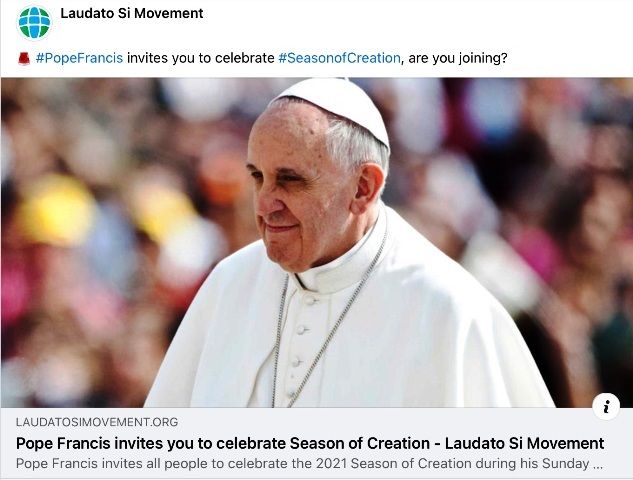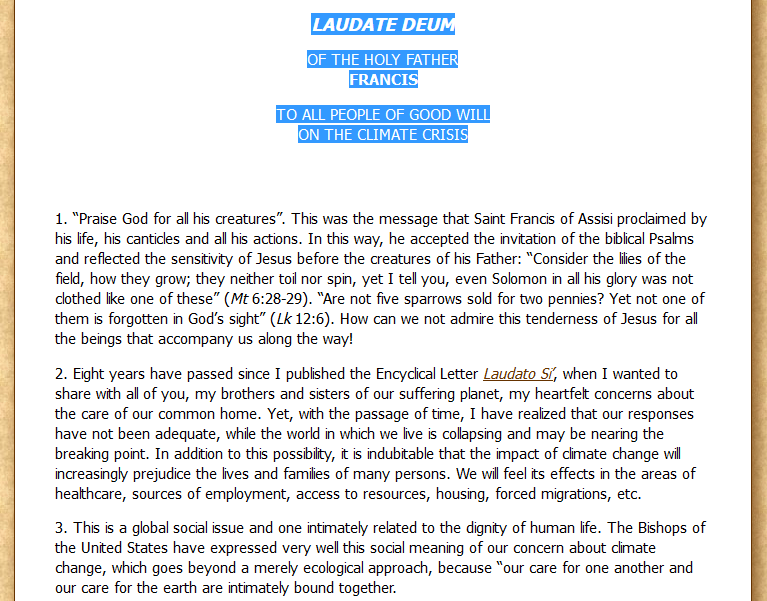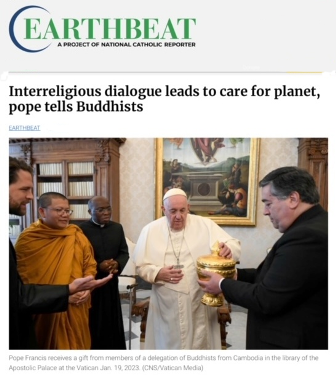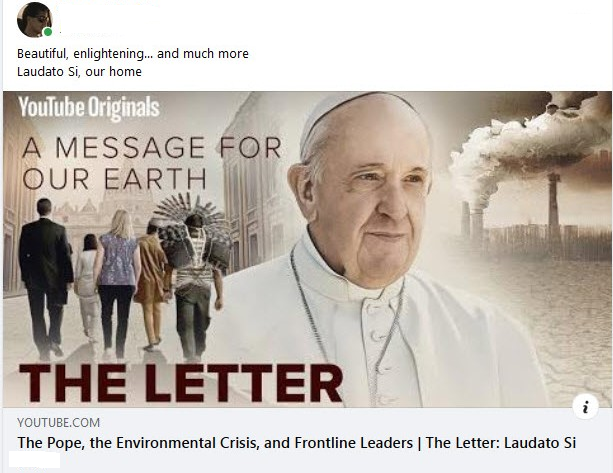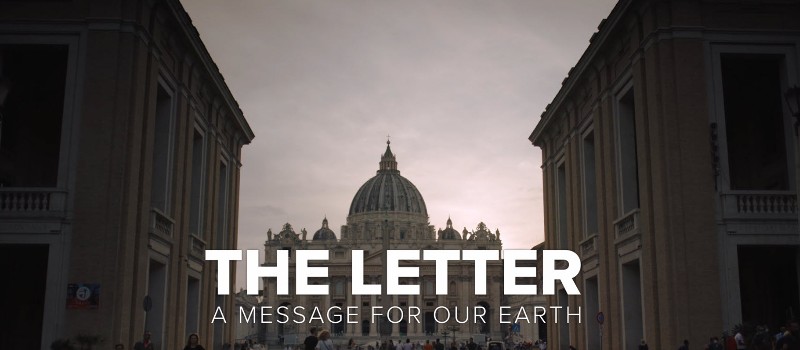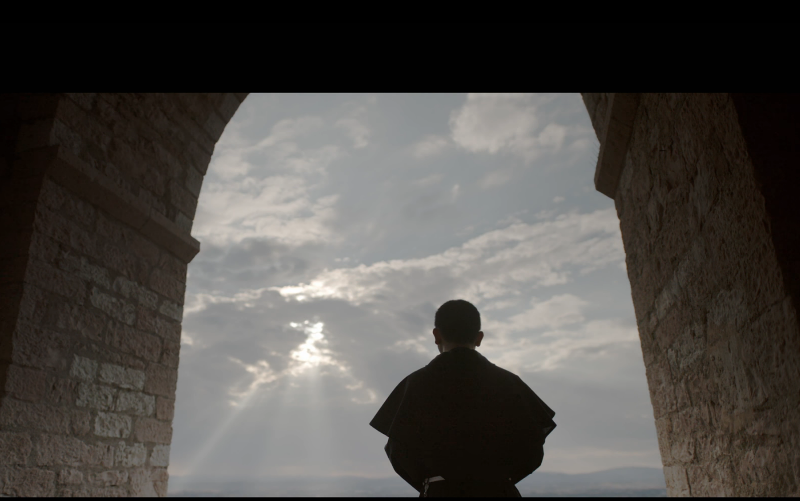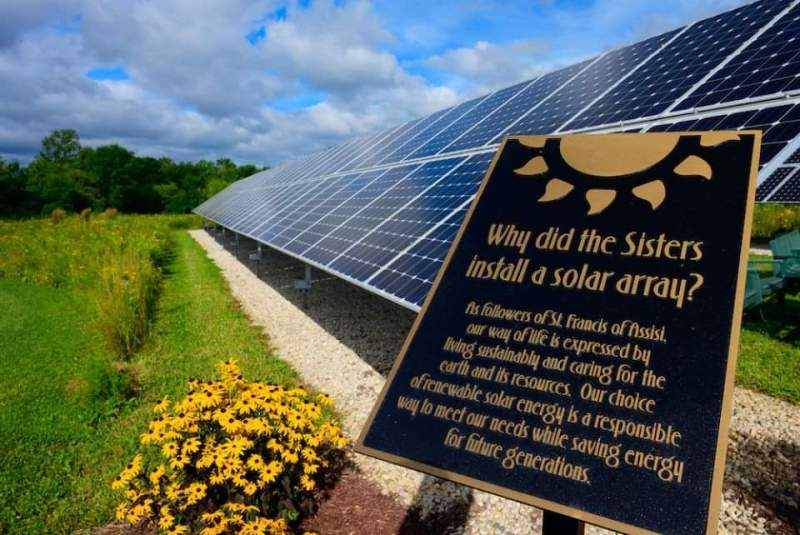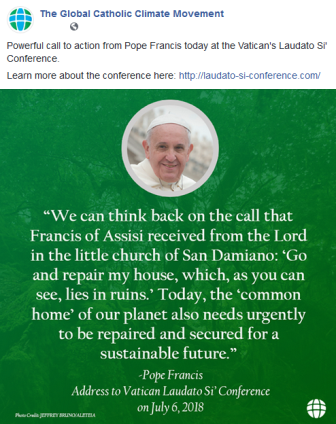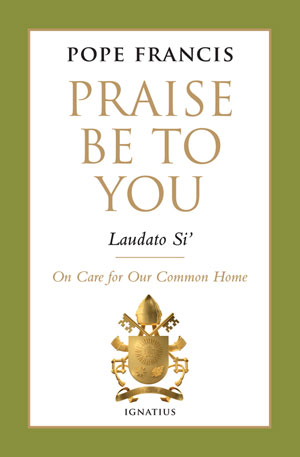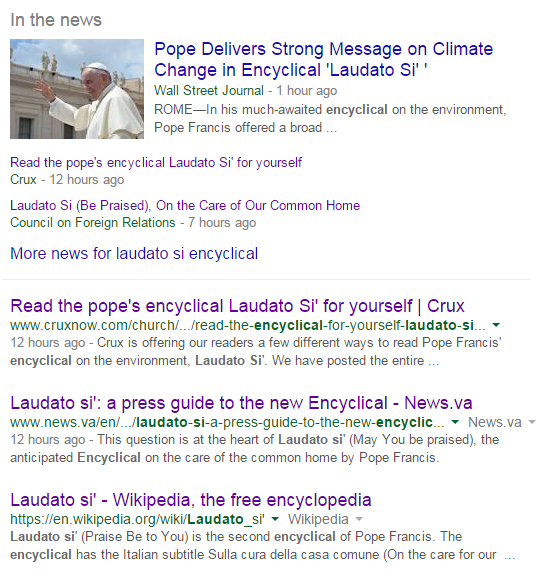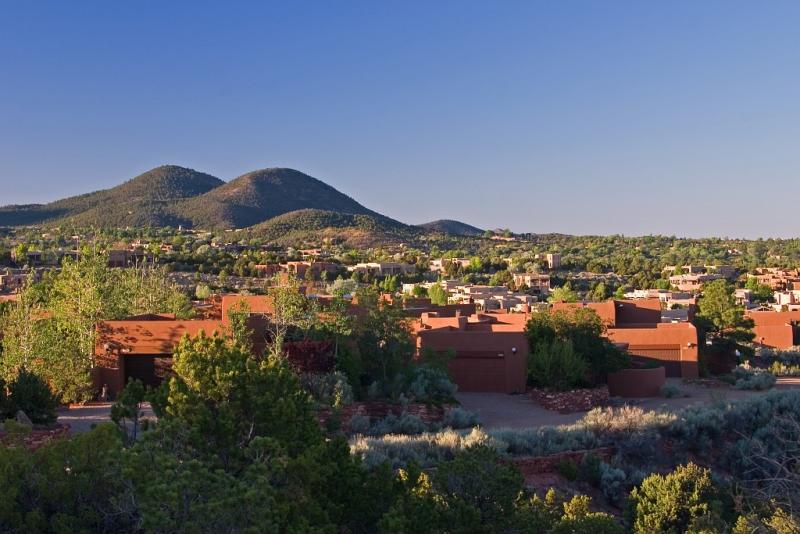Laudato Si: Difference between revisions
Siterunner (talk | contribs) No edit summary |
Siterunner (talk | contribs) No edit summary |
||
| Line 1: | Line 1: | ||
''"The urgent challenge to protect our common home includes a concern to bring the whole human family together to seek a sustainable and integral development, for we know that things can change... Humanity still has the ability to work together in building our common home."'' | <small>''"The urgent challenge to protect our common home includes a concern to bring the whole human family together to seek a sustainable and integral development, for we know that things can change... Humanity still has the ability to work together in building our common home."''</small> | ||
-- Pope Francis, Laudato Si', Chapter 1, 2015 | <small>-- Pope Francis, Laudato Si', Chapter 1, 2015</small> | ||
| Line 258: | Line 258: | ||
[[File:In the smallest creatures god.png]] | [[File:In the smallest creatures god.png]] | ||
In 1979, as a environmental movement became a global eco-ethics and call to action, Pope John Paul II proclaimed St. Francis of Assisi the patron of ecology in 1979. The pope spoke of the teachings of Francis being "an example of genuine and deep respect for the integrity of creation.... | |||
"St. Francis invited all creation — animals, plants, natural forces, even Brother Sun and Sister Moon — to give honor and praise to the Lord." | |||
An ecology of environmental protection and care can be seen in St. Francis of Assisi addressing creatures as "sisters" and "brothers," a living earth to be protected and sustained, not as subjects to be cast aside, dominated and extinguished. | |||
<big>'''''St. Francis 'Canticle''''''</big> | |||
''Most High, Omnipotent, Good Lord, | |||
:Thine be the praises, the glory, and the honor and every blessing (cf. Apoc. 4:9.11).'' | |||
''To Thee alone, Most High, do they belong | |||
:and no man is worthy to mention Thee.'' | |||
''May Thou be praised, my Lord, with all Thy creatures (cf. Tob. 8:7), | |||
:especially mister brother sun, | |||
:of whom is the day, and Thou enlightens us through him.'' | |||
''And he is beautiful and radiant with a great splendor, | |||
:of Thee, Most High, does he convey the meaning.'' | |||
''May Thou be praised, my Lord, for sister moon and the stars (cf. Ps. 148:3), | |||
:in heaven Thou has made them clear and precious and beautiful.'' | |||
[[File:Sun and Moon mountains, Santa Fe, New Mexico.jpg]] | |||
Revision as of 14:42, 3 November 2023
"The urgent challenge to protect our common home includes a concern to bring the whole human family together to seek a sustainable and integral development, for we know that things can change... Humanity still has the ability to work together in building our common home."
-- Pope Francis, Laudato Si', Chapter 1, 2015
🌎
································
Earthbeat
October 2023
Laudato Deum
🌎
January 2023
Eco-religious Dialogue
🌎
October 2022
The Letter: Laudato Si
- The Pope, the Environmental Crisis, and Frontline Leaders
An Original Film, October 2022
- 1,084,581 views as of Oct 4, 2022
························································
Pope Francis on the Environment
In 2015, Pope Francis wrote Laudato Si’; an Encyclical Letter about the environmental crisis to every single person in the world.
In Laudato Si’, the Encyclical Letter we are encouraged to see how "everything is connected."
In Laudato Si’, the Film, we are encouraged to see how the way we treat the Earth, our common home, is a reflection of how we treat each other. Caring for each other means caring for the home we share.
Laudato Si’, the Film, introduces us to "four voices that have gone unheard in global conversations" who have been invited to an unprecedented dialogue with the Pope. Hailing from Senegal, the Amazon, India, and Hawai’i, they bring perspective and solutions from the poor, the indigenous, the youth, and wildlife into a conversation with Pope Francis himself.
The documentary follows their journey to Rome and the extraordinary experiences that took place there, and is packed with powerfully moving personal stories alongside the latest information about the planetary crisis and the toll it’s taking on nature and people.
🌎
🌎
August 2021
From ‘Global Catholic Climate Movement’ to ‘Laudato Si' Movement’
"I think it is a door opening for us to involve everyone in the protection and care for our common home, and to keep pushing forward integral ecology, climate justice and social justice for everyone."
·······································
(Via Reuters) / June 2020
Five Years after the First Eco-Encyclical of the Catholic Church
The Vatican urged Catholics on Thursday (June 18, 2020) to disinvest from the armaments and fossil fuel industries and to closely monitor companies in sectors such as mining to check if they are damaging the environment.
The calls were contained in a 225-page manual for church leaders and workers to mark the fifth anniversary of Pope Francis’ landmark 2015 encyclical “Laudato Si” (Praised Be) on the need to protect nature, life and defenseless people.
The compendium suggests practical steps to achieve the goals of the encyclical, which strongly supported agreements to contain global warming and warned against the dangers of climate change.
The manual’s section on finance said people “could favor positive changes ... by excluding from their investments companies that do not satisfy certain parameters.” It listed these as respect for human rights, bans on child labor and protection of the environment.
Called ‘Journeying Towards Care For Our Common Home’, one action point called on Catholics to shun “shun companies that are harmful to human or social ecology, such as abortion and armaments, and to the environment, such as fossil fuels”.
Another section called for the “stringent monitoring” of extraction industries in areas with fragile ecosystems to prevent air, soil and water contamination.
Digging Into Laudato Si'
by Samantha Panchèvre and Robert McKim / NCR
When it comes to intergenerational solidarity, Pope Francis asks us to consider,
"What kind of world do we want to leave to those who come after us, to children who are now growing up?"
·························································································································
The Catholic Faith and First Environmental Encyclical
Nearly three years after the publication of Laudato Si’, Pope Francis’ encyclical letter on the care for our common home, the Pontiff’s prophetic words continue to ring:
- “What kind of world do we want to leave to those who come after us, to children who are now growing up?”
- July 5 - 6, 2018
The inspiration to care for our common home ultimately springs from our faith that the natural world is God’s creation entrusted to our care.
- The ultimate challenge of Laudato Si' is to act... to inspire a “massive movement” for the care of our imperiled common planetary home. The Conference... brings together representatives of the civil society, religions, churches, scientists, politicians, economists, grassroots movements, et al., in short “all people of good will”, to dialogue and act together.
News from the Laudato Si' conference (2018)
(Via United Press International/UPI) "The pace of consumption, waste and environmental change has so stretched the planet's capacity that our contemporary lifestyle, unsustainable as it is, can only precipitate catastrophes," Pope Francis said Friday. "There is a real danger that we will leave future generations only rubble, deserts and refuse."
The pope referred to this year's COP24 environmental summit, set for Poland in December, saying discussions there could be significant for the path set out by the 2015 Paris agreement, which set stringent standards to restrict carbon emissions and other greenhouse gases.
"We all know that much still needs to be done to implement that agreement. All governments should strive to honor the commitments made in Paris, in order to avoid the worst consequences of the climate crisis," the pope said. "Reducing greenhouse gases requires honesty, courage and responsibility, above all on the part of those countries which are more powerful and pollute the most.
"We cannot afford to waste time."
Pope Francis said the world now has too many special interests, and economic interests can easily trump the common good.
"Human beings, while capable of the worst, are also capable of rising above themselves, choosing again what is good, and making a new start. Please continue to work for the radical change which present circumstances require," he said.
In closing, the pontiff looked to Saint Francis of Assisi, the patron saint for the environment, for inspiration.
"May our struggles and our concern for this planet never take away the joy of our hope."
················································
The First 'Eco-Encyclical'
The First Catholic Pontiff to be named after Saint Francis of Assisi, the Patron Saint of the Environment, Commits the Catholic Faith to Environmental Activism
An Eco-Encyclical for the Ages
- The encyclical, dated 24 May 2015, was officially published at noon on 18 June 2015. Laudato si'' (English: Praise Be to You!) is the second encyclical of Pope Francis. The encyclical has the subtitle "on care for our common home". In it, the pope critiques consumerism and irresponsible development, laments environmental degradation and global warming, and calls all people of the world to take "swift and unified global action." Since Lumen fidei, released in 2013, was largely the work of Francis's predecessor Benedict XVI, Laudato si' is generally viewed as the first encyclical that is entirely the work of Francis.
Laudato Si': Chapter 5, sections 4 and 5
"It should always be kept in mind that 'environmental protection cannot be assured solely on the basis of financial calculations of costs and benefits. The environment is one of those goods that cannot be adequately safeguarded or promoted by market forces'. Once more, we need to reject a magical conception of the market, which would suggest that problems can be solved simply by an increase in the profits of companies or individuals. Is it realistic to hope that those who are obsessed with maximizing profits will stop to reflect on the environmental damage which they will leave behind for future generations?" (190).
"As long as production is increased, little concern is given to whether it is at the cost of future resources or the health of the environment; as long as the clearing of a forest increases production, no one calculates the losses entailed in the desertification of the land, the harm done to biodiversity or the increased pollution. In a word, businesses profit by calculating and paying only a fraction of the costs involved" (195).
Pope Francis on the Environment
In 1979, as a environmental movement became a global eco-ethics and call to action, Pope John Paul II proclaimed St. Francis of Assisi the patron of ecology in 1979. The pope spoke of the teachings of Francis being "an example of genuine and deep respect for the integrity of creation....
"St. Francis invited all creation — animals, plants, natural forces, even Brother Sun and Sister Moon — to give honor and praise to the Lord."
An ecology of environmental protection and care can be seen in St. Francis of Assisi addressing creatures as "sisters" and "brothers," a living earth to be protected and sustained, not as subjects to be cast aside, dominated and extinguished.
St. Francis 'Canticle'
Most High, Omnipotent, Good Lord,
- Thine be the praises, the glory, and the honor and every blessing (cf. Apoc. 4:9.11).
To Thee alone, Most High, do they belong
- and no man is worthy to mention Thee.
May Thou be praised, my Lord, with all Thy creatures (cf. Tob. 8:7),
- especially mister brother sun,
- of whom is the day, and Thou enlightens us through him.
And he is beautiful and radiant with a great splendor,
- of Thee, Most High, does he convey the meaning.
May Thou be praised, my Lord, for sister moon and the stars (cf. Ps. 148:3),
- in heaven Thou has made them clear and precious and beautiful.
~
- Anthropocene
- Biodiversity
- Climate Change
- Climate Policy
- Creation Spirituality
- Earth360
- Eco-ethics
- Eco-nomics
- Eco-Spirituality
- Eco-Theology
- Ecology Studies
- Environmental Protection
- Environmental Security
- Extinction
- Green Best Practices
- Green Values
- Microorganism
- Natural Resources
- Natural Rights
- Nature
- Planet Citizen
- Resilience
- Strategic Demands
- Sustainability
- Whole Earth
- Youth
